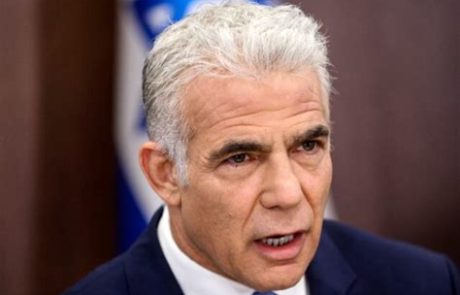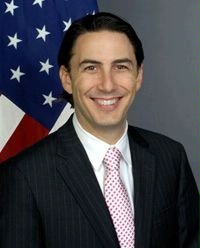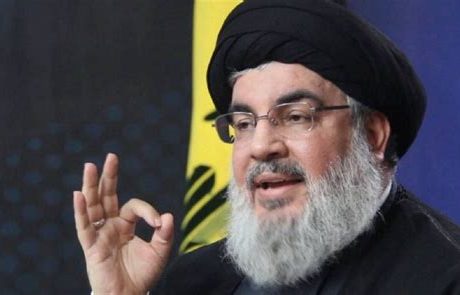![]()
A Maronite bishop is detained, and the leader of Hezbollah threatens Israel over Mediterranean gas
“Whoever wanted to deliver a political message to [Maronite Patriarch] Al-Rai through Bishop El-Hage’s arrest can consider the message received, but Al-Rai will never shift positions.” –a source close to Maronite Patriarch Bechara Boutros Al-Rahi (also spelled “Al-Rai” or simply “Rai”), speaking after the controversial July 18 arrest and detention of a high-ranking Maronite bishop by agents of the Lebanese intelligence services at the border of Lebanon and Israel
“If Bishop El-Hage’s detention was a message to the Church to silence it, then we say that the Church cannot be intimidated. It only fears its God, and listens to the voice of conscience and duty.” –-Elias Aoude, the Greek Orthodox Metropolitan Archbishop of Beirut, commenting on Maronite Catholic Bishop Moussa El-Hage’s July 18 arrest in his sermon in Lebanon on July 24
“The golden opportunity is now. It is now, during these two months. And now there are less than two months left, what’s left of July and August… We have a golden opportunity now. Why do I say golden opportunity? If there was no war between Russia and Ukraine, there would not be this (urgent) need of Europe and the United States for gas and oil. I don’t mean that they will import gas and oil from Lebanon, because to install sea platforms, extract hydrocarbons and sell them, it takes years. But Lebanon’s strength is that it can be a problem, an obstacle… to the Israeli entity, and create a problem in the whole region that will prevent the extraction of gas and oil (in the Mediterranean), and will prevent the sale of gas and oil to Europe.” — Hezbollah Secretary General Sayed Hassan Nasrallah in a July 13 speech (link) concerning US President Joe Biden’s July visit to the Middle East and a simmering dispute between Lebanon and Israel over the Karish maritime gas field. Israel is ready to begin drilling for the gas and oil, but Lebanon and Israel do not yet have an agreement on where exactly the border between their two countries lies (in this case, the border is on the bottom of the Mediterranean sea, and passes through very large deposits of gas and oil; a slight change in the agreed border could mean billions of dollars more — or billions less — for one country or the other). The Hezbollah leader, Nasrallah, is saying that his Hezbollah militants will interrupt any drilling, by flying drones over the drilling platforms — as Hezbollah did on July 2, until the drones, which were not armed, were shot down by Israel — to frighten the oil workers and compel their employers to allow them to retire to safety, unless there is a fair agreement already in place…
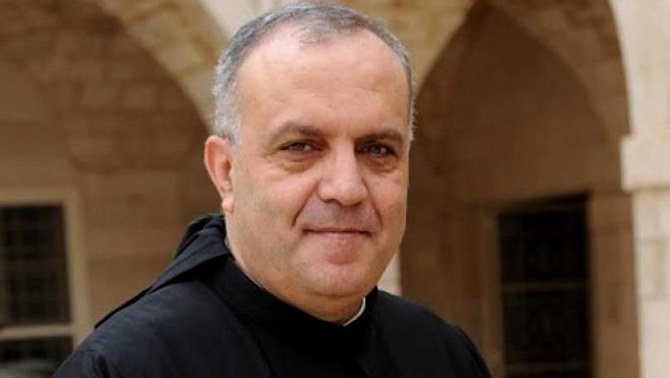
Bishop Moussa El-Hage, 68, the Maronite Archbishop of the Archeparchy of Haifa and the Holy Land and the (Maronite) Patriarchal Exarch of Jerusalem and Palestine and Jordan (link). Bishop El-Hage was arrested and detained for 12 hours of questioning by agents of the Lebanese intelligence service on July 18 while returning to Lebanon from Israel. [Source: Arab News]
The negotiating team: left, Prime Minister Yair Lapid of Israel, who said on July 19 that “aggression” by the Iran’s proxy in Lebanon, Hezbollah, will not be tolerated; speaking during a tour of the Israeli Defense Force Northern Command and Israel’s northern border with Lebanon, Lapid said Israel is interested in Lebanon being a “stable and prosperous neighbor that is neither a platform for Hezbollah terrorism nor an Iranian tool” (link), center, Amos J. Hochstein, 48, a U.S. businessman, diplomat, and lobbyist who served in the Barack Obama administration and was appointed Deputy Assistant Secretary of State in 2011 and Special Envoy and Coordinator for International Energy Affairs; and right, the Secretary-General of the Muslim group Hezbollah in Lebanon, Sayyed Hassan Nasrallah, who has threatened war with Israel if a fair agreement is not reached on the oil beneath the Mediterranean, adding “There is no oil extraction in the whole of the Israeli entity if Lebanon does not take its right.”
Lebanon Report 2022, #8: Tuesday, August 2
Lead Story
Lebanese Maronite Bishop Detained After Visiting Israel
Meanwhile, a dispute over off-shore gas and oil rights threatens to bring a dangerous new conflict between Muslim Hezbollah forces in southern Lebanon and the state of Israel…
By Christopher Hart-Moynihan, Director, Friends of Lebanon Project (link)
The often precarious political status of Christians in the Holy Land was demonstrated yet again this month when on July 18 a Maronite Catholic bishop was arrested, detained, and questioned for 12 hours while returning from Israel to Lebanon.
And peace itself is now precarious as a dispute between Israel and Lebanon over undersea gas and oil deposits off the coast of northern Israel and southern Lebanon continues to grow more tense with each passing day.
The dispute is over how exactly to chart the underwater border between the two countries in order to determine precisely who owns which part of these undersea deposits, and it is now threatening to spiral into an armed conflict, as the leader of the Muslim Hezbollah movement in southern Lebanon, Hezbollah Secretary General Sayed Hassan Nasrallah, publicly threatened in a July 13 speech to send armed drones over the Israeli oil platforms if they begin drilling before the dispute is settled.
It is estimated that tens of billions of dollars of oil and gas may lie under the disputed area of the Mediterranean — enough to enable Lebanon to escape from its present financial crisis, which has caused misery throughout the country…
On July 13, in a programmatic speech addressed to his Hezbollah followers, but also to the Lebanese government, Nasrallah said publicly that he believes the gas field negotiations must be completed this summer. “I was very affected to hear (Lebanese) officials say that with the grace of God, the (maritime border agreement between Israel and Lebanon) will be concluded in September,” Nasrallah said in his July 12 speech. “It will be too late! In September, it will be too late. If you don’t get your rights before September, and if you don’t agree on the maritime border before September, and the US and the UN have not recognized Lebanon’s rights, after this two-month period, things will be much harder and the price will be much higher… Maybe if you let these two months pass, you (Lebanese officials) will not get anything, except by paying a very high price (war).”(link)
Thus, a very tense situation has been created in southern Lebanon, involving negotiations over billions of dollars of oil and gas fields, and threats of war if the negotiations do not move forward rapidly, and it is not clear how this situation will be resolved.
***
Dossier
Talks between Lebanon and Israel, with an American advisor to aid the negotiations
This report (below) was published yesterday, August 1, on the status of the negotiations between Israel and Lebanon on the maritime boundary between the two countries. Here are the first lines of the report, which is from Xinhua, a Chinese news agency (link):
BEIRUT, Aug. 1, 2022 (Xinhua) — The US mediator in the indirect negotiations to demarcate Lebanon’s maritime border with Israel, Amos Hochstein, expressed optimism on “continuing the progress” made in this file over the past weeks. [Note: Here is a link to a biography of Hochstein.)
This came in a statement by Hochstein after talks he held with Lebanese President Michel Aoun, Parliament Speaker Nabih Berri and Caretaker Prime Minister Najib Mikati.
“I am waiting for my return and soon to the region to finish this file and reach a conclusion,” Hochstein said.
During the meeting, Hochstein presented to the Lebanese side, according to a statement issued by the Lebanese presidency, “the outcome of the consultations he held with Israeli officials regarding the issue of demarcating the southern maritime borders, and listened to a unified Lebanese position in accordance with the declared Lebanese constants.”
After the meeting, Berri was asked whether the meeting was positive. He only said, “God willing, it is good.”
As for Mikati, he did not make any statement, contenting himself with a positive gesture from his hand. (…)
***
From this Xinhua report, and others, it seems clear that a great effort is being made in these days to conclude an Israel-Lebanon agreement on the maritime boundaries off the coast of the two countries.
Here is further background, from the same Xinhua account of August 1 (link):
“Lebanon and Israel, under the auspices of the United Nations and mediated by Washington, held five rounds of indirect negotiations between October 2020 and May 2021 to discuss the demarcation of the maritime border, but the negotiations were frozen due to differences over technical criteria to complete the demarcation,” the article says.
What was the issue?
“Negotiations began regarding a disputed marine area in the Mediterranean, amounting to 860 square kilometers, believed to contain quantities of oil and gas, but Lebanon, based on recent legal and geographic studies, reported that the disputed area is 2,290 square kilometers, which Israel rejects,” the report says.
So the issue concerns about 1,470 square kilometers of territory beneath the Mediterranean Sea, off the coast where the borders of Lebanon and Israel meet.
The negotiations have dragged on now for more than a year with no conclusion, and evidently Israel decided to initiate drilling in June, before an agreement was reached.
The report says: “On June 14, Lebanon invited the American mediator, Hochstein, to visit Beirut to discuss the completion of the maritime border negotiations with Israel, after the latter [that is, Israel] sent on June 5 a platform to extract gas to the Karish field, which Lebanon considers a disputed area.”
It was after this action that threats of sending drones to stop the drilling preparations were made by the Hezbollah head, Nasrallah.
All of this suggests that it is greatly to be hoped that an agreement on these 1,470 kilometers of sea bottom can be reached in the next few weeks, as it would seem that an agreement should end the impasses, and threats, and be of great benefit to all parties…
***
Here below is a brief announcement about our pilgrimages in September to Lebanon, Sept. 17-25. If you would like to travel with us, we would like to have you join us! —CHM
“Friends of Lebanon”
Pilgrimage to Lebanon
Urbi et Orbi Communications and Unitas: Friends of Lebanon are excited to announce that we will be going on pilgrimage to Lebanon this September 17-25.
During these days in Lebanon, we will spend time in Beirut meeting with religious leaders, including an expected meeting with Maronite Patriarch Bechara Boutros al-Rahi, 82.
We will also visit holy sites in and around Beirut, such as the monastery of St. Charbel, as well as spending three days in the astonishing Qadisha Valley, the “Holy Valley” of northern Lebanon and the heart of Lebanese monasticism (see image below).
This pilgrimage is open to all who have donated to the Friends of Lebanon initiative, but space is limited, so all who are interested are asked to contact our office for more information. Please call: +1.202-536-4555 or email [email protected].
We are looking forward to “building bridges” with these Christian communities, whose presence in the Middle East dates back to the time of Christ and the apostles.
Building closer ties to these “brothers and sisters” is one of the main goals of our Unitas: Friends of Lebanon initiative.
We believe that these closer ties can contribute to peace and stability in Lebanon, so that, in the words of Jocelyne Khoueiry, “blessings return, peaceful solutions arrive, violence vanishes.”
Again, for info on our pilgrimage, click here.
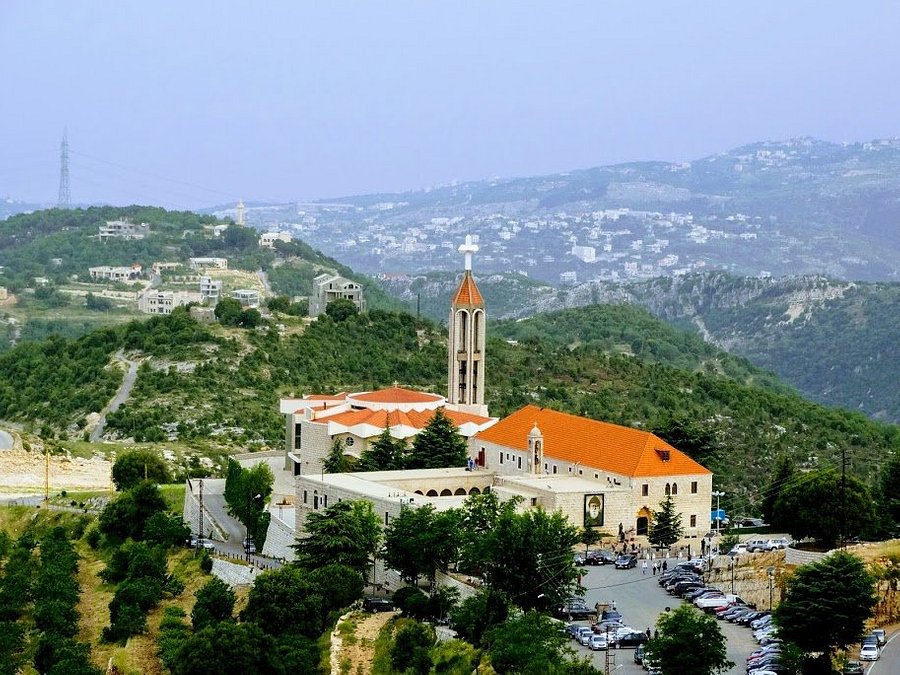
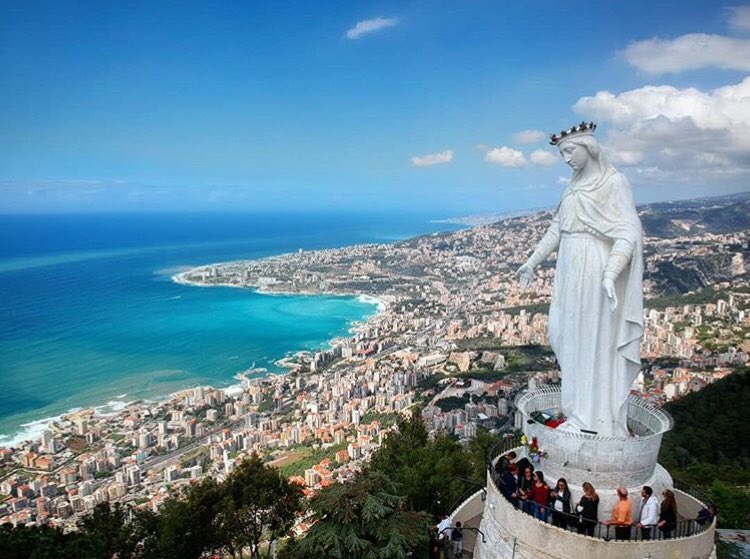
News
The July 18 arrest and interrogation of a Maronite bishop
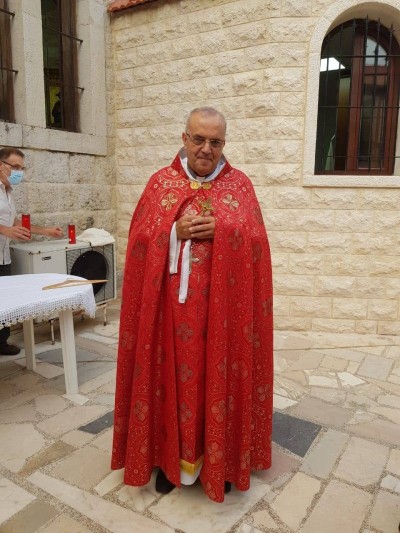
Bishop El-Hage photographed at the convent of St. Nohra Church in Kornet el-Hamra, Lebanon, on July 21, the Thursday after his Monday, July 18 arrest and detention. [Source: Jeanine Jalkh/L’Orient-Le Jour]
Bishop Moussa El-Hage, 68, the Maronite Archbishop of Haifa and Jerusalem (the Holy Land) was detained for 12 hours on July 18 by agents of the General Directorate of General Security in the southern Lebanese city of Nakoura.
According to reports (see link and link), the archbishop had crossed the border from Israel to Palestine at the Ras Naqoura border station, which is reserved for clerics and the diplomatic corps.
After the incident, the Vatican’s envoy to Lebanon, Maltese Archbishop Joseph Spiteri, made comments to a local television station calling El-Hage’s arrest a “dangerous” precedent.
The detention and questioning of the bishop seemed to be a way of sending a message to the Maronite Church, and specifically to Patriarch Bechara Boutros al-Rahi, who over the past few months has been taking an increasingly public position on key issues related to the neutrality and territorial integrity of Lebanon.
The Patriarch’s calls to respect Lebanon’s neutrality and territorial integrity are widely seen as a rebuke to Hezbollah, a political party and paramilitary force that wields enormous influence at all levels of Lebanese society, including inside the government. Hezbollah functions essentially as a “state within a state” throughout much of southern Lebanon and remains locked in a decades-long conflict with Israel.
Reports also stated that Bishop El-Hage had his passport and cell phone confiscated, as well as medications and food supplies. The archbishop had been given these food supplies by Lebanese living in Israel, who wished them to be delivered to their family members living across the border in Lebanon. (Many Lebanese, and especially Christian Lebanese, have been living in Israel since the 2000 withdrawal of Israeli troops from southern Lebanon, which left the territory open to occupation by Hezbollah forces. Reluctant to live in Hezbollah-controlled territory, many of the people living in this southern region instead sought refuge in Israel after the Israeli forces withdrew, and have been living in Israel since then. Of an estimated population of 6,000 Lebanese who fled to Israel, it is estimated that currently about 3,000 individuals remain in Israel, while Bishop El-Hage has spoken of “nearly 4,000 individuals”.)
Bishop El-Hage was also carrying roughly $460,000 — this was financial support from the Lebanese Christian communities living in Israel intended for their relatives in Lebanon. These funds were also confiscated.
It should be noted that, according to many sources including the Maronite Patriarchate, it is customary for Bishop El-Hage to make a monthly trip from Lebanon to Israel and back. So the archbishop had likely crossed the border at Ras Naqoura many times, but he had never been detained until now.
In an interview given several days after his detention, Bishop El-Hage stated that those responsible for his arrest wanted to “send a strong message to the Patriarch.” He also affirmed that he had been making regular trips between Lebanon and Israel for many years.
The text of the interview with the archbishop (translated from the original interview in French from Lebanese news service L’Orient-Le Jour) is given below in full.
***
Interview
“Those who arrested me did not act on their own; there is certainly a political party behind them”
Interview with Maronite Catholic Bishop Moussa El-Hage on his arrest and questioning on July 14 on the border between Lebanon and Israel
The original interview with the archbishop, published in French in L’Orient-Le Jour on July 22, can be found here.
***
“Blessed are those who are persecuted for the good they do. Saint Nohra was arrested and tortured for his good works and his faith. A bit like how it happens nowadays,” began Moussa El-Hage, in a playful tone, in reference to the incident he had just experienced with the SG [General Security]. “You should know, however, that my suffering is nothing in comparison with that of the Lebanese,” he added. The Maronite dignitary agreed to answer our questions and to return at length to his arrest and its consequences.
How do you explain the timing of your arrest?
Maronite Bishop of Haifa and Jerusalem Moussa El-Hage: It seems that these new developments are intended to make the patriarch bend. The objective is clearly to send a strong message to the patriarch. This is a very dangerous precedent. Those who arrested me did not act on their own. There is certainly a political party behind them that pushed them in this direction.
What are the rules governing your travel between Israel and Lebanon?
Bishop El-Hage: The armistice agreement with Israel in 1949 includes a clause which stipulates that the bishops of the Holy Land can cross the border. Bishops of parishes in the [Israeli-controlled] occupied territories can also come to Lebanon, but they do not. Bishops of the Holy Land have always crossed the border, sometimes in a car, and have never been bothered. After the civil war, Bishop Boulos Sayyah made this same trip for sixteen years. Then I came to replace him. I have been crossing this border on a regular basis for ten years, once a month, with the exception of the pandemic period.
How do you explain your arrest then?
Bishop El-Hage: We must bear in mind the visit made by Hezbollah officials to the Patriarch in 2014. They clearly told him that he was forbidden to go to the occupied territories. He told them that no one could tell him what he can or cannot do. Since then, relations between Bkerké [the seat of the Maronite Patriarch] and Hezbollah have been strained. Even more so since the head of the Church raised his voice and expressed very clear-cut positions about the presidential term and the profile of the future president. So now they are trying to harm him through me.
What do you think could be the consequences of this incident?
Bishop El-Hage: The Patriarchate covered everything in its statement. The situation has become untenable from all perspectives. Abuses have multiplied; moral, psychological and physical aggressions, too, against certain parts of society, coming from a certain camp. Now they are attacking the Maronite Church. They know perfectly well that it is a fundamental pillar in Lebanon and that the Patriarch expresses himself as freely as possible and they seek to subdue him. His words bother them.
Could this affair take on a diplomatic dimension, with a possible intervention by the Vatican?
Bishop El-Hage: Of course. If the case is not settled, it could go further. They confiscated my passport and my cell phone, and all of the aid that I was transporting. The Vatican has been updated on the situation. For the time being, they are giving the local ecclesiastical authorities room to maneuver and supporting them. But if necessary, they will intervene. If they are going to be stubborn and refuse to give me back my passport, the Patriarch will not be silent.
Bkerké has asked for the dismissal of Judge Fadi Akiki. Why?
Bishop El-Hage: Judge Fadi Akiki summoned me at 11 a.m. on Wednesday, but I did not go to the court. During my interrogation at the border, Judge Akiki was calling the officer in charge every five minutes and following the process closely. He was the one who was almost dictating the report to the officer, the report that the officer then sent to the court.
How did the interrogation go?
Bishop El-Hage: I was not mistreated, but I was mainly disturbed by the length of the interrogation – for twelve hours straight, from 11 a.m. to 11 p.m. I was especially saddened by what they did with the medications I was carrying. Some medicines had writing in Hebrew. They took everything except some medications that weren’t written on.
You were carrying $460,000 with you. Why?
Bishop El-Hage: This is aid that I have been sending to families for months, and it is never to the same people. I have been carrying out this service for ten years. Since the explosion of the port on August 4, 2020 and the economic collapse, the sums have increased because the need has become greater.
Who was this aid for?
Bishop El-Hage: I had on me a list of individuals with their names and phone numbers. Every person in the occupied territories who wants to send money to their family in Lebanon comes to their parish to give me the envelope. Those who arrested me claim that this money is intended for the families of the agents of Israel and seek to punish me.
These are not agents; they are Lebanese who fled to Israel (Editor’s note: after Israel’s withdrawal in 2000). There are also many Palestinians among them. This is certainly not the first time that I have made this trip, bringing aid with me. There are currently nearly 4,000 Lebanese sending aid, including 30 Shia families. General Security began yesterday to summon the recipients of this aid one by one in order to question them – including the Shias among them, who are marked as traitors in the eyes of their community. They despise them much more than the Christians.
Is it legal to transport money and medicine between Lebanon and Israel?
Bishop El-Hage: They consider it not to be. I don’t know what will happen to the money they confiscated. They claim the funds will be withheld, but the patriarch has filed a complaint and is asking for the money to be returned.
Do you plan to return to Israel?
Bishop El-Hage: Of course. As soon as I can get my passport back. They have no right to forbid me to do so. I follow the procedure to the letter each time by sending a travel request to UNIFIL [the United Nations Interim Force in Lebanon, a U.N. peacekeeping force established in 1978, with its headquarters in Naqoura, Lebanon]. Moreover, the UNIFIL soldiers did not leave me alone during the interrogation.
[End, interview with Bishop El-Hage]
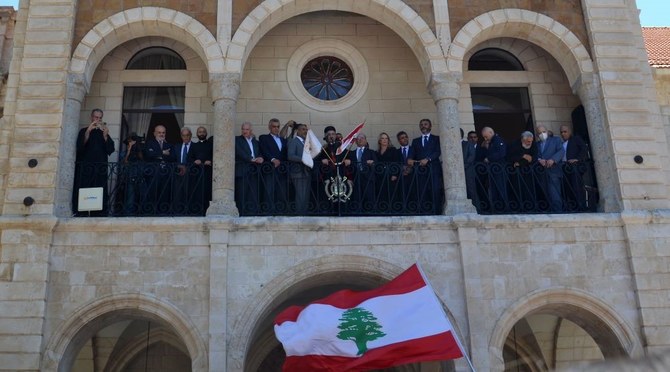
Maronite Patriarch Bechara Boutros Al-Rahi speaks to a crowd protesting the arrest of Bishop El-Hage in Dimane, northern Lebanon, on Sunday, July 24
Analysis
Patriarch Rai Responds to El-Hage’s Arrest
Patriarch Bechara Boutros al-Rahi (also written as “Patriarch Rai”) is currently staying at his summer residence in Dimane, in northern Lebanon. (Dimane overlooks the Kadisha Valley, Lebanon’s “Holy Valley”, which we will be visiting this September during our pilgrimage to Lebanon).
The Patriarch responded to the arrest of Bishop El-Hage in a speech before a crowd of protestors in Dimane on July 24 – the Sunday following the archbishop’s detention.
In his speech, Patriarch Rai emphasized that Bishop El-Hage was simply carrying out duties that he — and all of his predecessors — have been engaged in for the past decades and centuries in their role as bishops of the Holy Land. He also called for the confiscated aid to be returned to Bishop El-Hage so that it could be distributed to its intended recipients: Lebanese families in need.
A report from the Arab News website quoted sections of the Patriarch’s speech:
“We reject these actions with political implications and we demand that the bishop’s seized belongings, including his passport, mobile phone, the aid, money and medicines, be returned to him, as Lebanese in the holy occupied lands entrusted him to deliver this aid to their families in Lebanon from all sects,” Patriarch Rai said. “That is what the Maronite bishops used to do for years in the past and what he should continue doing in the future.”
Patriarch Rai said that Bishop Al-Hajj [El-Hage] “maintains the Christian, Palestinian and Arab presence inside Israel and deserves to be praised and supported instead of attacking his dignity and honorable message.”
The Patriarch also addressed the illegality of Bishop El-Hage’s detention:
“If there’s a law that prohibits anyone from bringing humanitarian aid into the country, let them show it to us.”
The report continued:
“Patriarch Rai said that the laws stipulated that no bishop of priest should be prosecuted without the Patriarch’s permission. ‘What happened constitutes an attack on and an insult to the Maronite Patriarchate and me personally.’
“Former Justice Minister Ibrahim Najjar argued that ‘Lebanon has already signed Code 1060 issued by the Eastern Churches, stipulating that only the Roman pontiff has the right to prosecute bishops in criminal cases. Therefore, no civilian or military authority has the right to prosecute any bishop in criminal cases.'”
The detention of the archbishop was also denounced by other religious and political leaders in Lebanon, including the Greek Orthodox Metropolitan Archbishop of Beirut, Elias Aoude:
“Any criminal, thief and lawbreaker should be held accountable and punished. However, what happened with Bishop Al-Hajj is unacceptable and shows that there is a new security and judicial approach leading to serious repercussions nationwide,” Greek Orthodox Metropolitan Archbishop Elias Aoude of Beirut said in his Sunday sermon. This is a dangerous and unacceptable thing and we hope it won’t happen again.” Aoude said that if Bishop Al-Hajj’s detention was a “message to the Church to silence it, then we say that the Church cannot be intimidated. It only fears its God, and listens to the voice of conscience and duty.” (report).
***
Amin Gemayel, the former president of Lebanon, also spoke out against El-Hage’s arrest:
“Arresting Al-Hajj while on a pastoral and humanitarian mission, and summoning him for investigation before the military court constitute a harsh blow by a political-judicial-security narrow-minded thinking against the role represented by the archbishop of the holy land through his care for the conditions of the Maronites, as well as all other Christian and Muslim denominations in Jerusalem and the Palestinian territories.”
Gemayel added: “We reject this political message addressed to Al-Rai in response to his patriotic stances.”
***
Finally, the archbishop also received support from the leaders of the Druze community, which in the past has allied itself both with Hezbollah and with various Christian political parties in Lebanon, at different times:
“The Druze community’s religious authority said that Al-Hajj was transporting aid sent by good samaritans in Palestine to relatives or charities in Lebanon and Syria. It also condemned Al-Hajj’s arrest and defamation, and said that the issue should be viewed from a humanitarian standpoint.” (link)
***
Below are two maps of the area where Bishop El-Hage was stopped and detained on July 18.
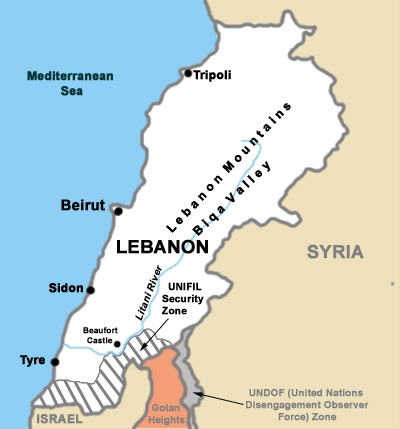
A map of Lebanon showing the area administered by UNIFIL [the United Nations Interim Force in Lebanon]. In the interview given shortly after his detention, Bishop El-Hage mentions that UNIFIL agents “did not leave [him] alone” at any point during his 12-hour detention and questioning by the Lebanese General Directorate of General Security
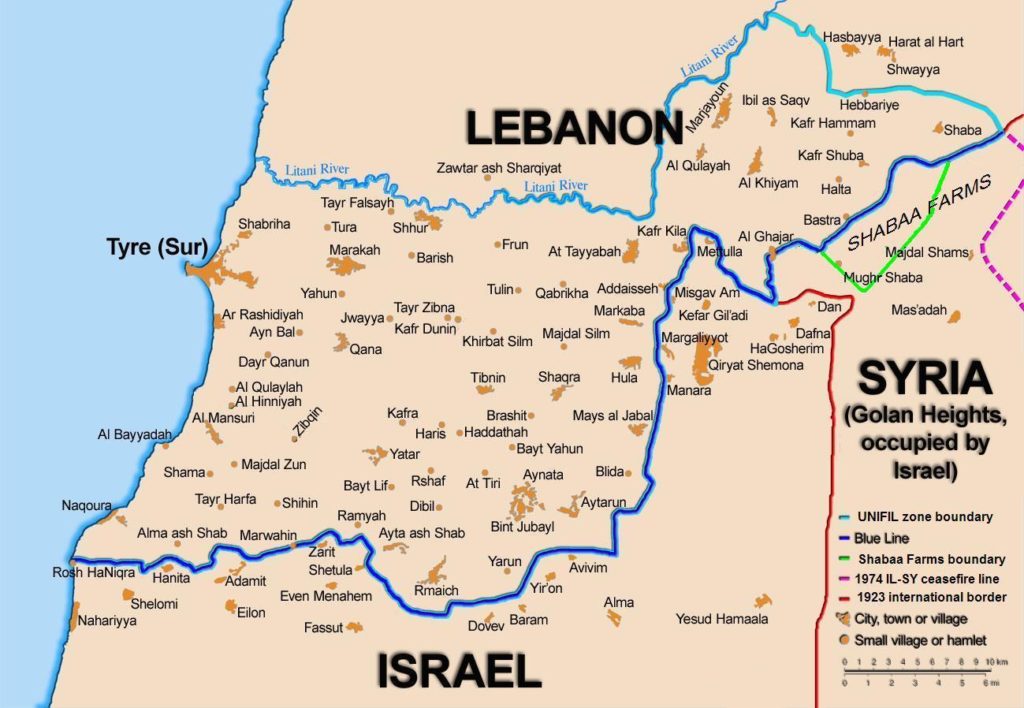
A closer look at the area formerly occupied by Israel in southern Lebanon. Naqoura, the city where Bishop El-Hage was detained after crossing the border from Israel, can be seen on the far left, on the coast of the Mediterranean Sea
What Does Bishop El-Hage’s Arrest Mean for the Future of Lebanon?
The “El-Hage affair” is far from concluded, as several issues remain unclear.
The Maronite Patriarchate has claimed that the archbishop’s arrest is illegal, claiming that as a bishop he cannot be prosecuted by civilian or military authorities. In addition, both the Patriarchate and Bishop El-Hage himself are claiming that the arrest was politically motivated and that the judge hearing the case, Judge Fadi Akiki, is collaborating closely with political actors who seek to weaken the power of the Patriarchate and the Maronite Church in Lebanon.
In essence, they are claiming that the General Directorate of General Security (Lebanon’s agency for national security and intelligence gathering) and Lebanon’s judicial system have, in this case, been instrumentalized by these political actors in order to “send a message” to the Patriarch.
This “message” seems to be that groups such as Hezbollah and their allies continue to have the power to make life very difficult for the Maronite Church in Lebanon if the Patriarch dares to publicly contradict their agenda.
Meanwhile, the exact nature of the link between Hezbollah, Lebanon’s judiciary and the General Directorate is difficult to discern.
It is also unclear whether the Patriarchate has the political leverage to get the charges against Bishop El-Hage dismissed and to achieve the return of the confiscated funds and the other medical and food aid. This is an area where international intervention and mediation on the part of the Vatican may eventually come into play.
All of these small questions raise larger questions about the future of Lebanon: is it one in which the Christian Churches see themselves increasingly persecuted at the hands of a repressive “police state” controlled by Hezbollah and its allies, as Patriarch Rai warned in his July 24 speech? Or is an alternative vision possible?
Note: If you would like to support this type of writing about Lebanon — which is free — from a perspective of support for the ancient Christian communities of that region, please consider donating here. Thank you.
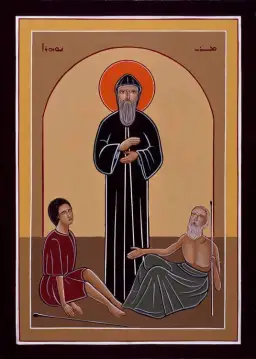
St. Nohra of Lebanon
Saint
A Beloved Lebanese Patron Saint of the Blind
In the interview after his arrest, Bishop El-Hage mentioned a beloved Lebanese saint who was an inspiration for him: St. Nohra. Here is a link to a biography of St. Nohra (link).
The bishop said that St. Nohra was arrested, tortured and executed for his faith and good works.
This saint, who is still popular in Lebanon today, is little known in the wider Christian world, but many churches throughout Lebanon are dedicated to him.
In the Maronite martyrology, St. Nohra was born in Persia, modern-day Iran, in the 200s, and traveled preaching the Gospel throughout Persia and many other areas of the Middle East. He suffered martyrdom in Lebanon, in the town of Smar Jbeil. His feast day is July 22.
The name “Nohra” in Syriac means “light” and St. Nohra is the patron saint of anyone suffering from blindness or eye diseases.
One wonders if this might apply even to spiritual blindness….
Please consider becoming a “Friend of Lebanon,” and help us to bring “short-term help” and “long-term hope” to the land where Jesus Christ walked and performed miracles.
As a “Friend of Lebanon,” you will be able to participate in our Zoom calls with the people we are working with in Rome, Beirut, and throughout Lebanon to support Christians in their ancient homeland.
Please consider joining us.
Christopher Hart-Moynihan
Director of Programs
Urbi et Orbi Communications
A Special and Very Important Note
As a special thank you to all of our Friends of Lebanon, we will host a bimonthly Friends of Lebanon Meet & Greet on the last Friday of every other month. This event will be held on Zoom. This will give you an opportunity to hear about our latest efforts as well as to speak with those who are on the ground in Lebanon. You can join us on Friday, August 26, 2022, at 11:00 a.m. Eastern by registering here.
Please enjoy a complimentary digital edition of Inside the Vatican Magazine by clicking here.
Christopher Hart-Moynihan
Director, Friends of Lebanon Project
Urbi et Orbi Communications

